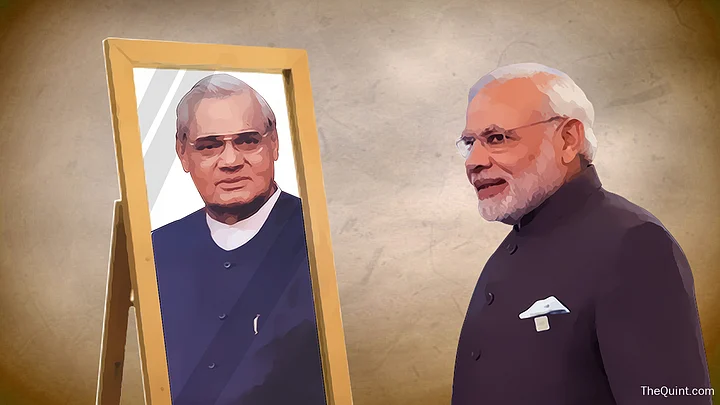Narendra Modi's views of the historical events at the time of partition are as problematic as his understanding of what happened in the subsequent periods. Inaugurating the new, plush, 170,000 sq. feet, vaastu-compliant Bharatiya Janata Party (BJP) office in New Delhi, he said that the party in its earlier avatar as the Jana Sangh was at the forefront of all the leading mass movements in the country.
However, this assessment is unlikely to be shared by those who are not followers of the BJP. In their opinion, far from being a leading player during popular agitations in the 1950s and 1960s, the Jana Sangh was very much on the margins of the political scene, if only because it carried the stain of responsibility for Mahatma Gandhi's assassination and was shunned by the Muslims. The liberal Hindus, too, looked at the Jana Sangh as a backward party of the "cow belt", representing all that was primitive in the Indian mind.
This somewhat lowly status can be seen from the fact that the Jana Sangh won only three Lok Sabha seats in the 1952 general election with 3.06 percent votes. Its subsequent performances were, at best, marginally better. The party won four seats in 1957 (5.93 percent), 14 seats in 1962 (6.44 percent), 35 seats, its best performance till then, in 1967 with 9.41 percent votes and 22 seats in 1971 (7.35 percent). These figures do not substantiate the claim about the Jana Sangh being a major player in the political scene.
Not surprisingly, the party was not averse to losing its identity in 1977, when it merged with three other equally marginal players — the Congress (O), the Congress for Democracy and the Socialist Party — to form the Janata Party. If the Jana Sangh was as important as it is claimed to be, it wouldn’t have given up its distinct status so readily.
As for the three others, they were all bit players and have since disappeared, although prominent politicians of the time – Morarji Desai, Charan Singh, Jagjivan Ram, Madhu Limaye – were associated with them.
However, it has to be acknowledged that the Jana Sangh was able to reinvent itself as the BJP after the latter was formed in 1980 and now represents one of the poles of Indian politics. From this standpoint, the loss of its earlier identity may have been a blessing in disguise for it could start all over again. But the crucial link between its earlier self and the present one remains. It is that of communalism — the cornerstone of its ideology.
Indeed, this trait has become even more pronounced with the BJP's assumption of power at the Centre in 2014. Nothing demonstrated this characteristic more starkly than the assertion by a BJP MP, Sakshi Maharaj, that Nathuram Godse, Mahatma Gandhi's assassin, was a patriot. It is a safe bet that a claim of this nature would not have been made by anyone in the Jana Sangh in the immediate post-Independence decades, when it was supposedly leading mass movements. The party simply did not have the confidence then to do so when it was unsure of its place in the social and political worlds.
As a result, the Jana Sangh had kept its core beliefs under wraps.
If the BJP is less discrete now, the reason is that it believes it has been somewhat better able than before to sell its anti-Muslim ideology in the garb of nationalism and by promising vikas or development which, it claims, can be provided only by Modi, who has been described as God’s gift to the nation by Vice President Venkaiah Naidu.
The BJP has also been helped by the weakening of its opponent, viz., the Congress, which no longer wears the halo as at the time of Independence and for about two decades afterwards, when it had no real challengers. At the same time, it is obvious that the BJP's progress at the central level has been by fits and starts, pointing towards flawed policies which do not have wide popular approval.
The party's first stint at the Centre under Atal Behari Vajpayee was followed by a break of 10 years, when the Congress was in power. Now, there is speculation that Narendra Modi may find it difficult to repeat his performance of 2014 when the BJP won a majority on its own in the Lok Sabha. The grapevine in Lutyens Delhi now predicts that the party's tally of seats will be around 200-220, dropping from the present 282.
Rumours of this nature explain the BJP's caution, as in its Jana Sangh days, against unfurling the Sangh parivar's saffron flag to the fullest extent possible. Sakshi Maharaj, for instance, has been told not to praise Godse again.
What this circumspection indicates is the BJP's realisation that it remains a square peg of sectarianism in the round hole of India's pluralism. From the Jana Sangh days to the present, the party of cultural nationalism – one nation, one people, one culture – has been an outsider, battling unsuccessfully against India's DNA of cultural assimilation.
(Amulya Ganguli is a political analyst. The views expressed are personal. He can be reached at amulyaganguli@gmail.com. This is an opinion piece and The Quint neither endorses nor is responsible for the views expressed here.)
(Published in an arrangement with IANS)
(The Quint, in association with BitGiving, has launched a crowdfunding campaign for an 8-month-old who was raped in Delhi on 28 January 2018. The baby girl, who we will refer to as 'Chhutki', was allegedly raped by her 28-year-old cousin when her parents were away. She has been discharged from AIIMS hospital after undergoing three surgeries, but needs more medical treatment in order to heal completely. Her parents hail from a low-income group and have stopped going to work so that they can take care of the baby. You can help cover Chhutki's medical expenses and secure her future. Every little bit counts. Click here to donate.)
